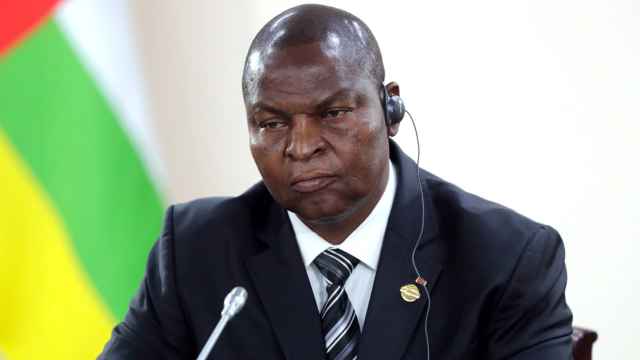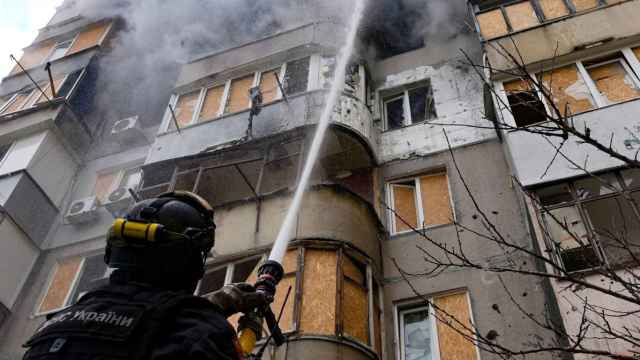Moscow called on Sunday for a new "reset 2.0" in relations with Washington, saying the situation in Ukraine that had led to Western sanctions against Russia was now improving thanks to Kremlin peace initiatives.
Washington and Brussels accuse Moscow of supporting a pro-Russian rebellion in eastern Ukraine and have imposed financial sanctions, which they have repeatedly tightened since Russia annexed Ukraine's Crimea peninsula in March.
The conflict has brought relations between Moscow and the West to their lowest level since the end of the Cold War. U.S. President Barack Obama said last week that the sanctions could be lifted if Russia takes the path of peace and diplomacy.
In a television interview, Russian Foreign Minister Sergei Lavrov said it was time to repeat the "reset," Washington's name for an attempt to improve ties early in Obama's presidency.
"We are absolutely interested in bringing the ties to normal but it was not us who destroyed them. Now they require what the American would probably call a 'reset,'" Lavrov said, according to a transcript of the interview on his ministry's website.
"The current U.S. administration is destroying today much of the cooperation structure that it created itself along with us. Most likely, something more will come up — a reset No. 2, or a reset 2.0," he said.
Shortly after Obama took office in 2009, his then-Secretary of State Hilary Clinton presented Lavrov with a red "reset" button intended to signal a fresh start to relations that had been strained under Obama's predecessor George W. Bush.
In a diplomatic gaffe much mocked at the time, the button bore a Russian label that said "overload" instead of "reset"; the two words are similar in Russian.
Lavrov said that thanks to "initiatives of the Russian president," the situation was improving on the ground in Ukraine, where a cease-fire has been in place for several weeks.
The Sept. 5 cease-fire is largely holding though some fighting has continued in places including the rebel stronghold of Donetsk.
"The cease-fire is taking shape, though of course not without problems. Monitoring mechanisms have been introduced, talks between Russia, the European Union and Ukraine have started, gas talks have restarted," Lavrov said.
Western countries say thousands of Russian troops have fought in Ukraine and accuse Russia of sending weapons, including a surface-to-air missile used to shoot down a Malaysian airliner over rebel-held territory in July. Moscow denies participating in the conflict or arming the rebels.
Lavrov said that despite the Western sanctions, Russia did not feel isolated on the world stage. Moscow has responded to the sanctions by banning imports of most food from Western countries.
"We feel no isolation. But, having said that, I want to emphasize in particular that we do not want to go to extremes and abandon the European and American directions in our foreign economic cooperation," Lavrov said.
"We have no desire to continue a sanctions war, trading blows," Lavrov also said. "First of all, it is important that our partners understand the futility of ultimatums and threats."
Later on Sunday, during an interview with state-run news agency RT, Lavrov was quoted as saying that the time had come for his country to modernize its nuclear and conventional arsenals.
"I don't think we are on the verge of a new arms race. At least, Russia definitely won't be part of it. In our case, it's just that the time has come for us to modernize our nuclear and conventional arsenals," Lavrov said, according to a transcript of the interview posted on RT's website.
"We have a long-term armament program that takes into account our economic situation and, of course, the need to have efficient and modern defensive capabilities to protect our national interest. … We haven't been doing much in this regard for a number of years," he said.
A Message from The Moscow Times:
Dear readers,
We are facing unprecedented challenges. Russia's Prosecutor General's Office has designated The Moscow Times as an "undesirable" organization, criminalizing our work and putting our staff at risk of prosecution. This follows our earlier unjust labeling as a "foreign agent."
These actions are direct attempts to silence independent journalism in Russia. The authorities claim our work "discredits the decisions of the Russian leadership." We see things differently: we strive to provide accurate, unbiased reporting on Russia.
We, the journalists of The Moscow Times, refuse to be silenced. But to continue our work, we need your help.
Your support, no matter how small, makes a world of difference. If you can, please support us monthly starting from just $2. It's quick to set up, and every contribution makes a significant impact.
By supporting The Moscow Times, you're defending open, independent journalism in the face of repression. Thank you for standing with us.
Remind me later.





